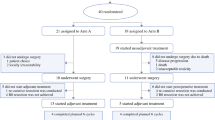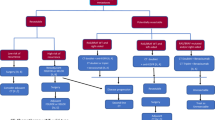Abstract
Background
Neoadjuvant immunotherapy with programmed death-ligand 1 blockade for colon cancer, especially for mismatch repair-deficient (dMMR)/high microsatellite instability (MSI-H) colon cancer, has gained considerable attention recently.
Objective
This study aimed to assess the safety and efficacy of neoadjuvant subcutaneous envafolimab in patients with dMMR/MSI-H locally advanced colon cancer.
Methods
Patients with dMMR/MSI-H locally advanced colon cancer treated with envafolimab at Sun Yat-sen University Cancer Center and Yunnan Cancer Hospital from October 2021 to July 2023 were retrospectively reviewed and analyzed. The primary endpoint was the pathological complete response (CR) rate, and secondary endpoints were treatment-related adverse events and complete clinical response rate.
Results
Overall, 15 patients were analyzed. After neoadjuvant immunotherapy with envafolimab, six patients achieved a CR, with five partial responses, and four stable disease. Three patients achieving a complete clinical response chose to accept a “watch and wait” strategy, and surgery was performed in 12 patients. Postoperative pathology results revealed seven patients achieved pathological CRs, and five patients achieved tumor regression grade 2, with 66.7% of the total CR rate. The most common treatment-related adverse events were pruritus and rash (40%), with no severe cases. No recurrences occurred over a 7.9-month follow-up.
Conclusions
Envafolimab yielded promising surgical outcomes and safety in dMMR/MSI-H locally advanced colon cancer, representing a promising treatment modality for this population.




Similar content being viewed by others
References
Siegel RL, Miller KD, Wagle NS, Jemal A. Cancer statistics, 2023. CA Cancer J Clin. 2023;73:17–48.
Hampel H, Frankel WL, Martin E, et al. Screening for the Lynch syndrome (hereditary nonpolyposis colorectal cancer). N Engl J Med. 2005;352:1851–60.
Sinicrope FA, Chakrabarti S, Laurent-Puig P, et al. Prognostic variables in low and high-risk stage III colon cancers treated in two adjuvant chemotherapy trials. Eur J Cancer. 2021;144:101–12.
Tarhini AA, Eads JR, Moore KN, et al. Neoadjuvant immunotherapy of locoregionally advanced solid tumors. J Immunother Cancer. 2022;10: e005036.
Morton D, Seymour M, Magill L, et al. Preoperative chemotherapy for operable colon cancer: mature results of an international randomized controlled trial. J Clin Oncol. 2023;41:1541.
Jung F, Lee M, Doshi S, et al. Neoadjuvant therapy versus direct to surgery for T4 colon cancer: meta-analysis. Br J Surg. 2021;109:30–6.
Gosavi R, Chia C, Michael M, et al. Neoadjuvant chemotherapy in locally advanced colon cancer: a systematic review and meta-analysis. Int J Colorectal Dis. 2021;36:2063–70.
André T, Shiu KK, Kim TW, et al. Pembrolizumab in microsatellite-instability-high advanced colorectal cancer. N Engl J Med. 2020;383:2207–18.
Le DT, Durham JN, Smith KN, et al. Mismatch repair deficiency predicts response of solid tumors to PD-1 blockade. Science. 2017;357:409–13.
Cohen R, Taieb J, Fiskum J, et al. Microsatellite instability in patients with stage III colon cancer receiving fluoropyrimidine with or without oxaliplatin: an ACCENT pooled analysis of 12 adjuvant trials. J Clin Oncol. 2021;39:642.
Huang AC, Orlowski RJ, Xu XW, et al. A single dose of neoadjuvant PD-1 blockade predicts clinical outcomes in resectable melanoma. Nat Med. 2019;25:454.
Schmid P, Cortes J, Dent R, et al. Event-free survival with pembrolizumab in early triple-negative breast cancer. N Engl J Med. 2022;386:556–67.
Forde PM, Spicer J, Lu S, et al. Neoadjuvant nivolumab plus chemotherapy in resectable lung cancer. N Engl J Med. 2022;386:1973–85.
Agostinetto E, Gligorov J, Piccart M. Systemic therapy for early-stage breast cancer: learning from the past to build the future. Nat Rev Clin Oncol. 2022;19:763–74.
van der Valk MJM, Hilling DE, Bastiaannet E, et al. Long-term outcomes of clinical complete responders after neoadjuvant treatment for rectal cancer in the International Watch & Wait Database (IWWD): an international multicentre registry study. Lancet. 2018;391:2537–45.
Chalabi M, Fanchi LF, Dijkstra KK, et al. Neoadjuvant immunotherapy leads to pathological responses in MMR-proficient and MMR-deficient early-stage colon cancers. Nat Med. 2020;26:566.
Chalabi M, Verschoor YL, van den Berg J, et al. Neoadjuvant immune checkpoint inhibition in locally advanced MMR-deficient colon cancer: the NICHE-2 study. Ann Oncol. 2022;33:S1389.
Hu HB, Kang L, Zhang JW, et al. Neoadjuvant PD-1 blockade with toripalimab, with or without celecoxib, in mismatch repair-deficient or microsatellite instability-high, locally advanced, colorectal cancer (P1CC): a single-centre, parallel-group, noncomparative, randomised, phase 2 trial. Lancet Gastroenterol Hepatol. 2022;7:38–48.
Cercek A, Lumish M, Sinopoli J, et al. PD-1 blockade in mismatch repair-deficient, locally advanced rectal cancer. N Engl J Med. 2022;386:2363–76.
Zhang F, Wei H, Wang X, et al. Structural basis of a novel PD-L1 nanobody for immune checkpoint blockade. Cell Discov. 2017;3:17004.
Papadopoulos KP, Harb W, Peer CJ, et al. First-in-human phase I study of envafolimab, a novel subcutaneous single-domain anti-PD-L1 antibody, in patients with advanced solid tumors. Oncologist. 2021;26:e1514–25.
Shimizu T, Nakajima TE, Yamamoto N, et al. Phase I study of envafolimab (KN035), a novel subcutaneous single-domain anti-PD-L1 monoclonal antibody, in Japanese patients with advanced solid tumors. Invest New Drugs. 2022;40:1021–31.
Li J, Deng Y, Zhang W, et al. Subcutaneous envafolimab monotherapy in patients with advanced defective mismatch repair/microsatellite instability high solid tumors. J Hematol Oncol. 2021;14:95.
von Elm E, Altman DG, Egger M, et al. The Strengthening the Reporting of Observational Studies in Epidemiology (STROBE) statement: guidelines for reporting observational studies. Ann Intern Med. 2007;147:573–7.
Mandard AM, Dalibard F, Mandard JC, et al. Pathologic assessment of tumor regression after preoperative chemoradiotherapy of esophageal carcinoma: clinicopathologic correlations. Cancer. 1994;73:2680–6.
Duffaud F, Therasse P. New guidelines to evaluate the response to treatment in solid tumors. Bull Cancer. 2000;87:881–6.
Wang DY, Salem JE, Cohen JV, et al. Fatal toxic effects associated with immune checkpoint inhibitors: a systematic review and meta-analysis. JAMA Oncol. 2018;4:1721–8.
Diaz LA Jr, Shiu KK, Kim TW, et al. Pembrolizumab versus chemotherapy for microsatellite instability-high or mismatch repair-deficient metastatic colorectal cancer (KEYNOTE-177): final analysis of a randomised, open-label, phase 3 study. Lancet Oncol. 2022;23:659–70.
Overman MJ, McDermott R, Leach JL, et al. Nivolumab in patients with metastatic DNA mismatch repair-deficient or microsatellite instability-high colorectal cancer (CheckMate 142): an open-label, multicentre, phase 2 study. Lancet Oncol. 2017;18:1182–91.
Ludford K, Ho WJ, Thomas JV, et al. Neoadjuvant pembrolizumab in localized microsatellite instability high/deficient mismatch repair solid tumors. J Clin Oncol. 2023;41:2181–90.
Zhang X, Yang RF, Wu T, et al. Efficacy and safety of neoadjuvant monoimmunotherapy with PD-1 inhibitor for dMMR/MSI-H locally advanced colorectal cancer: a single-center real-world study. Front Immunol. 2022;13:913483.
Eefsen RL, Larsen JS, Klarskov LL, et al. Therapy with pembrolizumab in treatment-naive patients with nonmetastatic, mismatch repair deficient colorectal cancer. Int J Cancer. 2023;152:2145–52.
**ao BY, Zhang X, Cao TY, et al. Neoadjuvant immunotherapy leads to major response and low recurrence in localized mismatch repair-deficient colorectal cancer. J Natl Compr Canc Netw. 2023;21:60-66.e5.
Han K, Tang JH, Liao LE, et al. Neoadjuvant immune checkpoint inhibition improves organ preservation in T4bM0 colorectal cancer with mismatch repair deficiency: a retrospective observational study. Dis Colon Rectum. 2023;66:e996-1005.
Chakrabarti S, Grewal US, Vora KB, et al. Outcome of patients with early-stage mismatch repair deficient colorectal cancer receiving neoadjuvant immunotherapy: a systematic review. JCO Precis Oncol. 2023;7: e2300182.
Burton S, Brown G, Bees N, et al. Accuracy of CT prediction of poor prognostic features in colonic cancer. Br J Radiol. 2008;81:10–9.
Dighe S, Swift I, Magill L, et al. Accuracy of radiological staging in identifying high-risk colon cancer patients suitable for neoadjuvant chemotherapy: a multicentre experience. Colorectal Dis. 2012;14:438–44.
Hirose K, Oki E, Shimose T, et al. Comparison of computed tomography imaging analyses for evaluation after chemotherapy in patients with colorectal cancer: a retrospective pooled analysis of six phase II clinical trials. Int J Clin Oncol. 2019;24:1397–405.
Dam C, Lund-Rasmussen V, Ploen J, et al. Computed tomography assessment of early response to neoadjuvant therapy in colon cancer. Dan Med J. 2015;62:A5103.
Horvat N, Raj A, Liu S, et al. CT colonography in preoperative staging of colon cancer: evaluation of FOxTROT inclusion criteria for neoadjuvant therapy. Am J Roentgenol. 2019;212:94–102.
Rahim MK, Okholm TLH, Jones KB, et al. Dynamic CD8+T cell responses to cancer immunotherapy in human regional lymph nodes are disrupted in metastatic lymph nodes. Cell. 2023;186:1127.
Le DT, Uram JN, Wang H, et al. PD-1 blockade in tumors with mismatch-repair deficiency. N Engl J Med. 2015;372:2509–20.
Saberzadeh-Ardestani B, Jones JC, Hubbard JM, et al. Association between survival and metastatic site in mismatch repair-deficient metastatic colorectal cancer treated with first-line pembrolizumab. JAMA Netw Open. 2023;6: e230400.
Acknowledgements
We greatly appreciate the help from all of our colleagues in the Department of Colorectal Surgery at Sun Yat-sen University Cancer Center who were involved in administering the treatments in the current study.
Author information
Authors and Affiliations
Corresponding authors
Ethics declarations
Funding
This study did not receive any specific grant from funding agencies in the public, commercial, or not-for-profit sectors.
Conflict of interest
Yuan Li, Weili Zhang, Jie Du, **long Hu, Ruixi Hu, Ziyang Zeng, E-er-man-bie-ke **-si-han, Shaopu Lian, Hao Wang, Yunfeng Li, Zhizhong Pan, Cheng Feng, Xuan Zhang, and Zhenhai Lu have no conflicts of interest that are directly relevant to the content of this article.
Ethics approval
All procedures conducted in studies involving human participants and human materials were approved by the Ethics Committee of Sun Yat-sen University Cancer Center (B2023-188-01). The study strictly adhered to the principles outlined in the Declaration of Helsinki and its subsequent amendments, or comparable ethical standards.
Informed consent
Informed consent was obtained from all patients prior to participating in this study.
Consent for publication
Not applicable.
Availability of data and material
The datasets used and/or analyzed during the current study are available from the corresponding authors on reasonable request. The authenticity of this article has been validated by uploading the key raw data onto the Research Data Deposit public platform (www. researchdata.org.cn), RDD number RDDA2024411157.
Code availability
Not applicable.
Author contributions
Conception and design: ZL, XZ, CF, and YL. Provision of study materials or patients: ZL, XZ, YL, RH, and JD. Collection and assembly of data: JD, LH, and WZ. Data analysis and interpretation: WZ, HW, SL, EEMBKJSH, and ZZ. Manuscript writing: WZ and YL. All authors read and approved the final manuscript.
Rights and permissions
Springer Nature or its licensor (e.g. a society or other partner) holds exclusive rights to this article under a publishing agreement with the author(s) or other rightsholder(s); author self-archiving of the accepted manuscript version of this article is solely governed by the terms of such publishing agreement and applicable law.
About this article
Cite this article
Li, Y., Zhang, W., Du, J. et al. Efficacy and Safety of Neoadjuvant Subcutaneous Envafolimab in dMMR/MSI-H Locally Advanced Colon Cancer. Targ Oncol (2024). https://doi.org/10.1007/s11523-024-01064-x
Accepted:
Published:
DOI: https://doi.org/10.1007/s11523-024-01064-x




